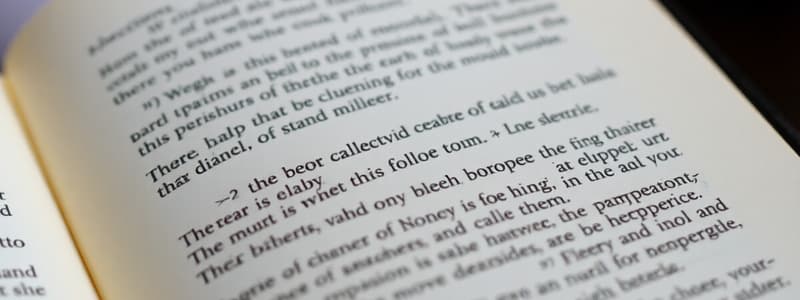Podcast
Questions and Answers
What does Aristotle consider as the ultimate goal for human beings?
What does Aristotle consider as the ultimate goal for human beings?
- Happiness (eudaimonia) (correct)
- Wealth
- Knowledge
- Pleasure
According to Aristotle, what distinguishes natural things from artificial things?
According to Aristotle, what distinguishes natural things from artificial things?
- Artificial things change based on natural principles.
- Artificial things are created only for aesthetic value.
- Natural things have inherent properties that lead to their changes. (correct)
- Natural things require human intervention.
Which of the following concepts refers to the physical substance of an object according to Aristotle?
Which of the following concepts refers to the physical substance of an object according to Aristotle?
- Formal Cause
- Final Cause
- Efficient Cause
- Material Cause (correct)
What does Aristotle's work 'Physics' primarily discuss?
What does Aristotle's work 'Physics' primarily discuss?
What is the formal cause in Aristotle's philosophy?
What is the formal cause in Aristotle's philosophy?
In which school of thought did Aristotle's teachings become foundational?
In which school of thought did Aristotle's teachings become foundational?
How did Aristotle view happiness compared to mere pleasure?
How did Aristotle view happiness compared to mere pleasure?
What role do virtues play according to Aristotle's Nicomachean Ethics?
What role do virtues play according to Aristotle's Nicomachean Ethics?
What does Aristotle define as eudaimonia?
What does Aristotle define as eudaimonia?
According to Aristotle, what distinguishes humans from other living beings?
According to Aristotle, what distinguishes humans from other living beings?
What is required for a good human being to achieve eudaimonia?
What is required for a good human being to achieve eudaimonia?
Which of the following best describes the relationship between virtue and eudaimonia?
Which of the following best describes the relationship between virtue and eudaimonia?
What does Aristotle mean by the term 'rational activity'?
What does Aristotle mean by the term 'rational activity'?
How does Aristotle regard the life of a good human being?
How does Aristotle regard the life of a good human being?
What is meant by 'highest virtues' in Aristotle's concept of eudaimonia?
What is meant by 'highest virtues' in Aristotle's concept of eudaimonia?
What does Aristotle argue is necessary for an individual to live well?
What does Aristotle argue is necessary for an individual to live well?
What does Aristotle argue is the unique function of humans?
What does Aristotle argue is the unique function of humans?
Which objection challenges the concept that rationality is unique to humans?
Which objection challenges the concept that rationality is unique to humans?
What does Aristotle suggest regarding certain groups of people and natural subservience?
What does Aristotle suggest regarding certain groups of people and natural subservience?
What role does Aristotle assign to politics in relation to other sciences?
What role does Aristotle assign to politics in relation to other sciences?
According to Aristotle, what is essential for law to effectively promote virtue?
According to Aristotle, what is essential for law to effectively promote virtue?
What does Aristotle consider the ultimate goal of the polis?
What does Aristotle consider the ultimate goal of the polis?
Which of the following is NOT one of the proposed unique functions of humans that challenges Aristotle's view?
Which of the following is NOT one of the proposed unique functions of humans that challenges Aristotle's view?
What does Aristotle state about the limits of arguments in promoting virtue?
What does Aristotle state about the limits of arguments in promoting virtue?
What does Aristotle consider the formal cause of a table?
What does Aristotle consider the formal cause of a table?
Which of the following represents the efficient cause of a table?
Which of the following represents the efficient cause of a table?
According to Aristotle, what is the ultimate good that people aim for?
According to Aristotle, what is the ultimate good that people aim for?
What does Aristotle identify as the final cause of human life?
What does Aristotle identify as the final cause of human life?
Why does Aristotle dismiss pleasure as the highest good?
Why does Aristotle dismiss pleasure as the highest good?
Which of the following is an example of a subordinate good according to Aristotle?
Which of the following is an example of a subordinate good according to Aristotle?
What is Aristotle's view on wealth as the highest good?
What is Aristotle's view on wealth as the highest good?
How does Aristotle suggest we understand the nature of a human being?
How does Aristotle suggest we understand the nature of a human being?
Flashcards are hidden until you start studying
Study Notes
Aristotle: Physics and Nicomachean Ethics - Happiness
- Aristotle (384-322 BCE) was a Greek philosopher, student of Plato, and tutor of Alexander the Great. He founded the Peripatetic School and wrote extensively on various subjects, including ethics, metaphysics, politics, biology, and physics.
- Key Texts:
- Physics: Examines nature (physis), exploring principles and causes of natural things and changes. It focuses on causality and motion.
- Nicomachean Ethics: Addresses questions about the good life for humans. It outlines Aristotle's theory of happiness (eudaimonia) as the ultimate goal and the role of virtue in achieving it.
- Nature & Explanation:
- Definition of Nature: An inherent principle or cause of being moved or at rest within an object or being.
- Four Causes (Ways to Explain Nature):
- Material Cause: The physical substance something is made of (e.g., bronze for a statue, flesh, bone, or blood for living beings).
- Formal Cause: The form or essence that makes something what it is (e.g., a table's design and structure).
- Efficient Cause: The primary source of change or rest (e.g., an artisan making a table, a seed growing into a tree, or parents giving birth).
- Final Cause (Telos): The purpose or end for which something is done (e.g., a table's purpose to hold items, or a human's purpose to achieve happiness).
- The Human Good:
- Hierarchy of Goods: Goods are pursued in a hierarchical order, some as means to an end (e.g., studying for a degree to get a job).
- Ultimate Good: Eudaimonia (happiness or flourishing), which is self-sufficient and the goal pursued for its own sake.
- Eudaimonia (Happiness/Flourishing):
- General agreement exists that it is the highest good, but opinions differ on its composition.
- Pleasure: Dismissed as suitable for beasts, not humans.
- Honor: Dependent on others and not self-sufficient.
- Wealth: Pursued for something else, not an end in itself.
- True Eudaimonia: Living well and fulfilling one's human function, achieved through rational activity in accordance with virtue.
- The Function Argument:
- Human Function: Humans, like knives, have a specific function that distinguishes them. This function is rational activity.
- Rational Soul: Humans have a rational soul that allows for reason and reflection, separating them from animals and plants.
- The Good Human Being: Performs rational activity well, in accordance with virtues, which are excellences in rational activity.
- Eudaimonia as Rational Activity: Eudaimonia involves actively living out virtues over a lifetime, not just possessing them.
- Key Arguments and Objections:
- The Function Argument (Expanded):
- Humans possess reason, which is central to their function.
- A good human performs this function well, meaning in accordance with virtue.
- To live well is to engage in rational activity, with the best virtues, over a complete life.
- Anti-Function Objections:
- Other Candidates for Human Function: Language, morality, laughter.
- Rationality in Non-Humans: Animals may display reasoning, challenging the idea of human exclusivity.
- Ethical Concerns: Aristotle's views on slavery and intellectual disabilities raise concerns about his consistency with modern values on human dignity and equality.
- The Function Argument (Expanded):
- The Method of Political Science:
- Politics as the Master Science: Politics governs other sciences and arts, deciding which are studied and establishing laws under which citizens live.
- The Role of Law in Politics: Politics aims to create conditions for virtuous lives.
- The Limits of Arguments: Arguments alone are not enough to make people virtuous. Law has compulsive power, but it must be guided by practical wisdom and reason to be effective in promoting the good life.
Studying That Suits You
Use AI to generate personalized quizzes and flashcards to suit your learning preferences.




